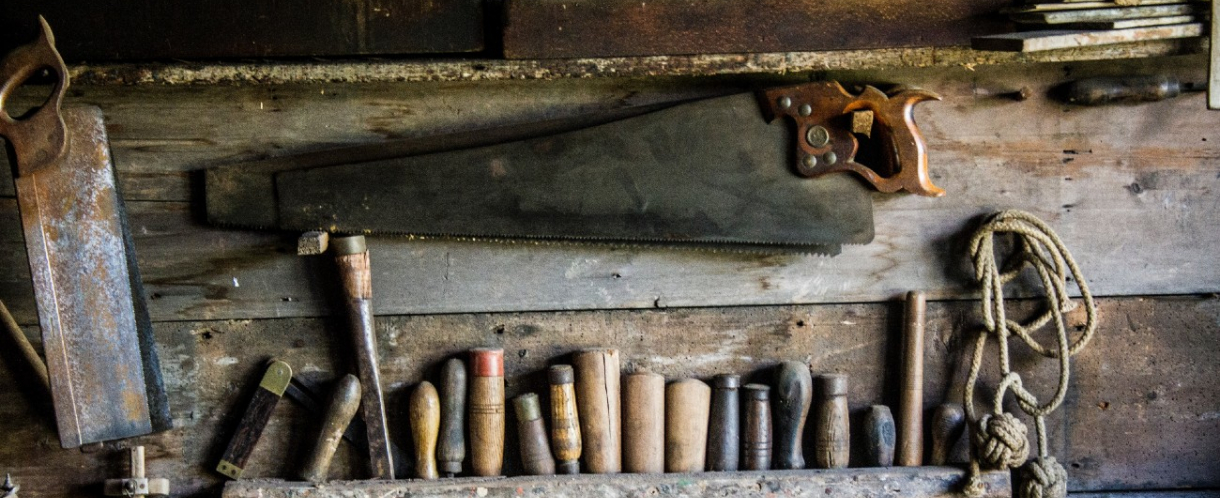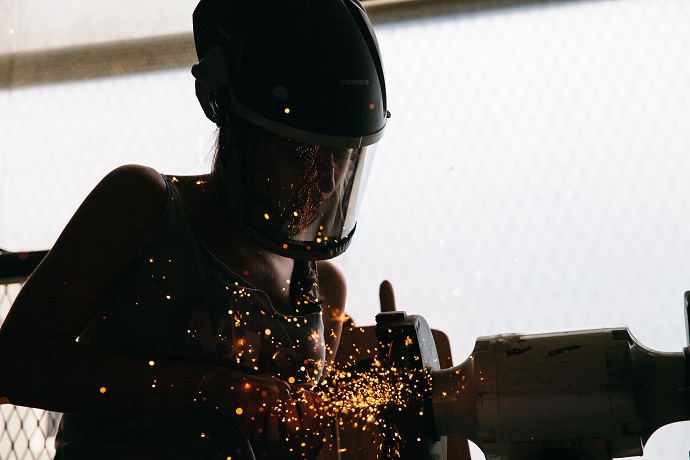
Newly Updated
Image: Philip Swinburn
Scientists, inventors and entrepreneurs use it; it's sparked the greatest achievements in the world; and it's something you use every day (but likely not in the most powerful way). Natasha explains the simple tool at the heart of a successful change – and how you can use it to unlock new 'aha' moments for your shift.
What is it you want most in your career change right now?
Is it clarity? Self-belief? The right connections? Knowledge – knowledge about whether you need those qualifications, knowledge about how to make things work financially?
Chances are, what you want from your career change is the answer to a question.
"What am I good at?"
"What would I enjoy?"
"Should I quit my job?"
"Am I aiming for something unachievable?"
"How can I make this work and still pay the bills?"
In fact, when you dig down to its core, the career-change journey is little more than a whirling tangle of questions. And, for most of us, that's a really, really uncomfortable space to inhabit.
We're well-trained to avoid having questions in our lives.
We're taught that to not know something is a failure. That to be without answers is to be without options.
This is is one of the biggest reasons why career change feels so incredibly uncomfortable: because we have no answers. And where we have no answers, we assume we have no power.
So, here we are, full of questions that have no answers, feeling powerless and confused and often, totally, totally stuck on how to make any kind of progress whatsoever.
And yet…
Career change is a space of transformation and innovation

It's a period of your life where you're engaged in creating something totally new, and doing it (to a greater or lesser extent) blindfolded.
There are thousands of people out there who are specialists in doing this. Entrepreneurs, activists, scientists… they spend almost all their time in a space of uncertainty and creation.
And, when we examine the fields of change and innovation, what's the most powerful tool?
Is it knowledge? A strong network of supporters? Self-belief? Money?
I'd argue: it's The Question.
When we look at the habits of some of the world's leading innovators and creative minds, people who create incredible things from nothing, what we discover is that they are all exceptionally good at asking questions.
For most of them, their greatest successes – game-changing inventions, innovative start-ups, radical solutions to difficult problems – can be traced back to a question (or series of questions).
Netflix is the product of someone asking: "Why do I have to pay late fees on my video rental?"
Kickstarter: "Would normal people fund one another's ideas?"
The moon landing: "How could we get up there?"
Changing career is a form of innovation, on a personal level, and requires the same kind of rigorous inquiry that a business or inventor would undertake.
So, what can we learn from these innovative people – these experts in asking questions – to apply to our own career changes?
Never assume you have 'the answer'

"An expert is someone who has stopped thinking, because he knows." – Frank Lloyd Wright
Have you chosen not to act on an idea or a potential opportunity in your career change, because you already know how it will turn out?
Perhaps you've ignored that little voice calling you toward photography because you know it's impossible to make money as a photographer.
Or perhaps you haven't called that person you met at a networking event, because you know she was just being polite when she gave you her business card, and you know she won't have anything useful to offer you.
Whatever you think you know, question it. Check it out, in the real world.
Ask yourself:
"Is that really true?"
"How could I find out if that's really true?"
"If I was wrong, what would be possible then? What would I do next?"
By staying loose, staying curious, and enjoying the idea that you don't have all the answers, you allow yourself to enter the realm of possibility. You allow new ideas to enter your world, new options, and new solutions to the obstacles you're presented with.
Answer your questions through action

This is especially important today, when we’re living in an world heavy with information. Without an effective filtering device, we could spend our lives living inside assumptions and limited by theories and intangible possibilities. Hard to grasp, let alone to use as a foundation for building a whole new career.
It's tempting and normal to try to figure out the answers to your questions in your head. After all, that's where questions live: in the intangible, theoretical world of the mind.
And yet, that's also where assumptions live, snuggled right up alongside untruths and media spin and your memories of what your dad said three years ago about how sitting directly opposite someone at an interview was bad feng shui.
The only way to get solid, reliable answers to your questions (and answers that reflect the unique and delicate reality of you and your situation, rather than huge sweeping generalisations about half the population) is to answer your questions through action.
Warren Berger, author of A More Beautiful Question, explained it perfectly in the following equations:
Q (questioning) + A (action) = I (innovation)
On the other hand,
Q - A = P (philosophy)
If you really want to get to the truth of the matter, and put yourself in a position to come up with innovative solutions to the challenges and obstacles you're facing, you're going to need to get out into the world and take action.
(Incidentally, this goes for everything we say, too. The Careershifters team is in a state of constant inquiry, and we expect you not to take everything we say as fact, but to get out there and test it out for yourself.)
Keep questions positive

"We live in the world our questions create." – Professor David Cooperrider
Professor Cooperrider developed the popular theory of 'appreciative inquiry'.
He discovered that organisations tend to gravitate toward the questions they ask. For example, if the questions from bosses focus more on 'Why are we falling behind?' or 'Who is to blame?' then company culture will become one of turf-guarding and finger-pointing. Conversely, if the questions are more expansive and optimistic, then that will be reflected in the culture.
And this isn't just true of companies.
Think of all the questions you ask yourself inside your head:
- "Why can’t I figure this out?"
- "Am I just chasing a pipe dream?"
- "Who's ever going to take me seriously?"
- "Why won't anyone consider me?"
Negative questions shut down your ability to innovate. You find yourself focusing on the problem, rather than the solution, and as a result feeling not only trapped by obstacles, but negative about yourself and your ability to move forward with your shift.
Round and round you go inside your head, feeling low, helpless, and unable to see a way out.
When you find yourself presented with a question, look at how you're articulating and framing it, and see if you can make it expansive and optimistic.
(Hint: making it a general question rather than a personal one really helps, too.)
- "How could someone without experience in a field get their foot in the door of this industry?"
- "Why would someone believe that it's possible to figure this out?"
- "What do I know about what I enjoy doing?"
- "What action could someone take to find out more?"
How could you reframe the questions you're asking to make them positive, rather than negative?
There's a process for asking meaningful and innovative questions

Warren Berger studied the art of asking questions for years. He immersed himself in the world of innovation, change, and inquiry, and discovered a process at the heart of creative problem-solving. It's based on three simple questions, asked through action and without bias.
Why / What If / How
Let's break this process down together (and if you're interested in reading more about the art of asking powerful questions, check out Berger's book: (A More Beautiful Question)
1. You encounter a situation that is less than ideal. The first question to ask is 'Why?' (and remember, ask it through action to make sure you're dealing with reality rather than assumptions). Getting clear about the 'why?' helps to frame the problem you're up against clearly, rather than dealing with a seething mass of resentment and hopelessness.
2. The next step is to begin to come up with ideas for possible improvements / solutions. These ideas usually surface in the form of 'What If?' questions.
Keep these 'what if' possibilities light, loose, and filter-free. You'll find yourself automatically doubting your answers to a 'what if' and shutting down your options, so it's really important to allow yourself to get creative, and maybe even a little silly, at this stage of the process.
3. Once you've got some powerful, creative 'what if' answers, take one of those possibilities and try to implement it or make it real. This mostly involves figuring out 'How?'.
Here's an example:
Katie is a PR consultant, and one of her long-standing interests and passions is marine biology and the ocean. The problem is, she doesn't have any relevant qualifications for getting an ocean-related job, and she can't afford to go back to school.
Let's go through the process:
- Why: Why does Katie believe she needs qualifications to get a job in marine biology?
- What if: What if she could achieve the outcome of doing the qualifications without actually retraining?
- How: How could she do that?
Right at the first step of the process, Katie needs to take action to find out why she needs qualifications. You've probably also noticed that this question could also be reworded to reflect the assumption she's made about a career on the ocean: "Do I really need qualifications to get a job in marine biology?"
By taking action at this point (perhaps getting in touch with someone working in this industry to ask them what qualifications, if any, she'd need to get a foot in the door), Katie may arrive at a solution right away.
If not, she comes up with a whole host of 'what if' questions. We've used one of those as an example above, but she could also ask:
What if she could move into the industry first, and retrain from the inside while working?
What if there were ways to retrain for free?
And then comes the How. Again, filter-free, she gets into creative mode and comes up with as many possible answers to the How as possible.
She could volunteer for a marine conservation organisation to build up her connections and knowledge of the industry.
She could get in touch with someone working in marine biology to ask if they know of any ways to achieve the necessary qualifications without it costing the earth.
She could reduce her hours at her day job and offer her PR services one day per week to a marine research centre, in return for training.
Or she could train as a diving instructor, which is much quicker and cheaper than a degree in marine biology, and try moving into the industry laterally, rather than waiting for a direct opportunity to show up.
Be OK with not knowing

"If you don't cultivate the disposition to question, you're going to fear change. But if you're comfortable questioning, experimenting, connecting things – then change is something that becomes an adventure. And if you can see it as an adventure, you're off and running." – John Seely Brown
When you throw yourself actively and joyfully into a space of curiosity, the world opens up.
When you allow yourself to be OK with not-knowing, with uncertainty and with only questions at your disposal, suddenly anything could be possible.
As soon as you think you have answers, your options are limited. You're trapped by your own beliefs about what's real and what's available to you, even if those beliefs are completely unfounded.
This week, I want to challenge you to enjoy the space of not-knowing. Become an innovator in your own life, and try on the lessons we've learned from people who create solutions every day. In the spirit of the quotation above by John Seely Brown, begin to experiment wildly and adventurously. Create powerful, positive, inquisitive questions for yourself, and seek out answers to your questions without attachment to a particular outcome.
What questions are you going to ask the world this week, and what actions are you going to take to begin answering them? Let me know in the comments below




